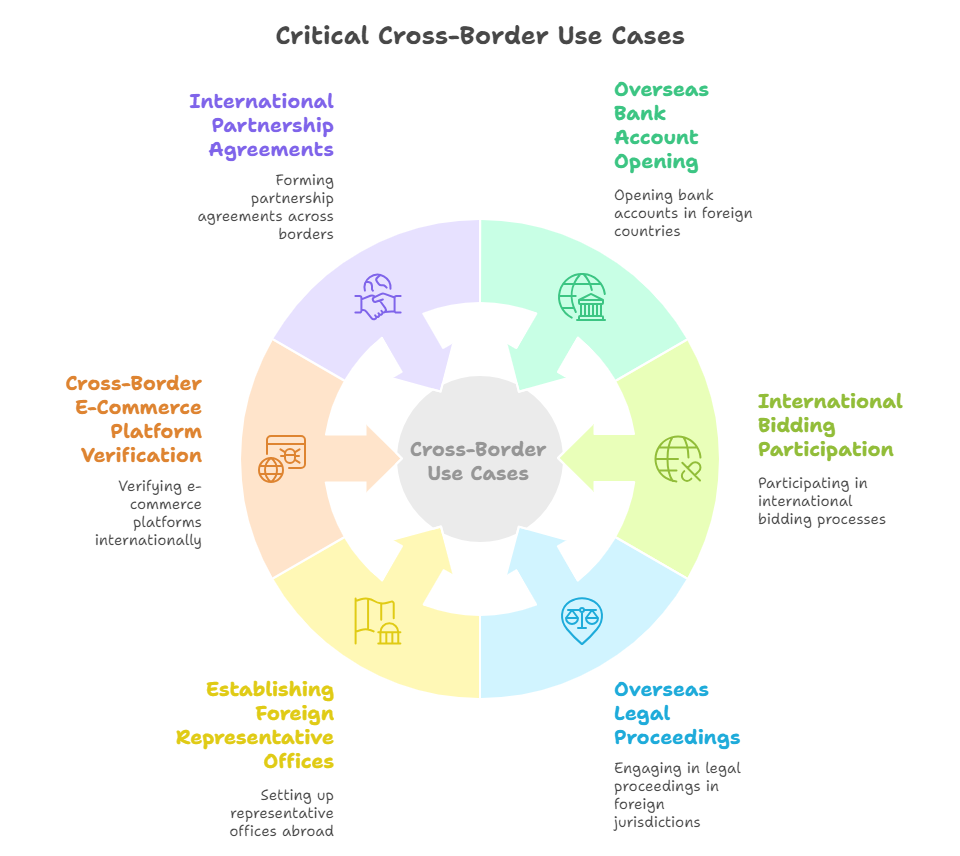Key Takeaways:
- China’s electronic business license (e-license) holds full legal validity equivalent to paper licenses
- Cross-border use requires Apostille certification for Hague Convention countries or consular legalization for others
- Major applications include overseas banking, legal disputes, tenders, and representative office setups
- Proper authentication is critical for international recognition and fraud prevention
China’s digital transformation has revolutionized corporate documentation, with the electronic business license emerging as a cornerstone for international business operations. Under Article 33 of China’s New Company Law (effective July 1, 2024), e-licenses issued by Chinese authorities carry identical legal weight as traditional paper documents. For global enterprises engaging with Chinese partners, understanding how to leverage this digital tool across borders is no longer optional—it’s essential for competitive operations.
What Exactly is China’s Electronic Business License?
This official digital certificate issued by China’s State Administration for Market Regulation (SAMR) contains all critical company details:
- Legal Chinese entity name and English translation (if registered)
- Unified Social Credit Code (China’s business ID number)
- Registered capital and business scope
- Legal representative information
- QR code for instant verification via government platforms
Unlike PDF scans, the authentic e-license features cryptographic signatures and dynamic verification codes that prevent forgery. Companies access it through:
- Official SAMR “e-License” mobile app
- Provincial government service portals
- WeChat/Alipay mini-programs
6 Critical Cross-Border Use Cases (With Authentication Requirements)

1. Overseas Bank Account Opening
When establishing corporate accounts in jurisdictions like Singapore or Switzerland, banks require:
- Certified e-license copy with Apostille (for Hague members)
- Legal representative’s identity documents
- Board resolution authorizing account opening
Authentication Tip: Financial institutions increasingly accept digitally verified licenses but often require paper-based certification until 2025 digital authentication treaties take effect.
2. International Bidding Participation
Global tenders (e.g., World Bank projects) mandate:
- E-license with dual certification (Chinese notarization + Apostille)
- Company qualification certificates
- Past project performance records
Compliance Note: Major procurement platforms like UNDP’s Quantum now integrate digital verification systems accepting authenticated e-licenses.
3. Overseas Legal Proceedings
Evidence submission in foreign courts requires:
- Notarized e-license translation
- Apostille certification (for 125 Hague countries)
- Chain of custody documentation
Critical Insight: UK and Australian courts now accept digitally authenticated Chinese e-licenses without paper backup in commercial dispute cases.
4. Establishing Foreign Representative Offices
Setting up branches in Germany or UAE necessitates:
- Embassy-certified e-license copy
- Office lease agreement
- Parent company financial statements
Regional Variation: While EU accepts Apostilled licenses, Middle Eastern countries generally require consular legalization.
5. Cross-Border E-Commerce Platform Verification
Amazon Global Selling or eBay requires:
- Verified SAMR digital credential
- Product compliance certifications
- Supply chain transparency documents
Platform Update: Amazon now directly verifies Chinese e-licenses through its Seller Central system without physical documents.
6. International Partnership Agreements
Joint ventures with Chinese firms require:
- Dually authenticated e-license
- Signatory authorization documents
- Capital verification reports
Risk Mitigation: 43% of cross-border disputes involve documentation issues—proper authentication prevents contract nullification.
The Authentication Imperative: Making Your e-License Globally Valid
While domestically recognized, international acceptance requires proper certification:
| Destination | Authentication Process | Timeline | Cost Range |
|---|---|---|---|
| Hague Convention Countries | Chinese notarization → Apostille | 10-15 days | $150-$300 |
| Non-Hague Countries | Chinese notarization → Foreign Affairs → Embassy | 15-30 days | $300-$800 |
Essential Steps:
- Notarization: Local Chinese notary public certifies e-license copy
- Apostille/Legalization: Apply through China’s MFA or provincial authorities
- Translation: Certified translation into destination country’s language
- Chain Verification: Maintain documented authentication trail
Pro Tip: Shanghai and Beijing offer expedited 3-day Apostille services for urgent transactions.
Why Authentication Matters More Than Ever
Recent cases demonstrate the stakes:
- A German importer lost $240,000 deposit due to unauthenticated supplier license
- Singaporean investor faced 6-month project delay from improperly legalized documents
- UK distributor incurred $18,000 in legal fees contesting unverified partner credentials
Properly executed authentication:
✅ Prevents contract repudiation
✅ Accelerates customs clearance
✅ Ensures payment processing
✅ Provides litigation protection
Future-Proofing Your Documentation Strategy
With China accelerating digital transformation:
- Blockchain verification: SAMR’s pilot with Guangdong-Hong Kong-Macao Greater Bay Area
- Direct government verification: 37 countries testing API integration with Chinese authorities
- Digital Apostille initiatives: Hague Convention’s e-Apostille Program (2025 implementation)
Companies should:
- Maintain both digital and authenticated physical copies
- Implement quarterly document audits
- Establish centralized authentication management systems
Authentic verification is your first line of defense in cross-border engagements. When dealing with Chinese entities, always insist on properly certified documents. Our Apostille Service ensures your electronic licenses meet international legal standards, while our Enterprise Credit Reports provide the due diligence needed for secure partnerships.
As digital credentials evolve, so should your verification protocols. Stay compliant, stay protected, and leverage China’s digital transformation to your global advantage.
